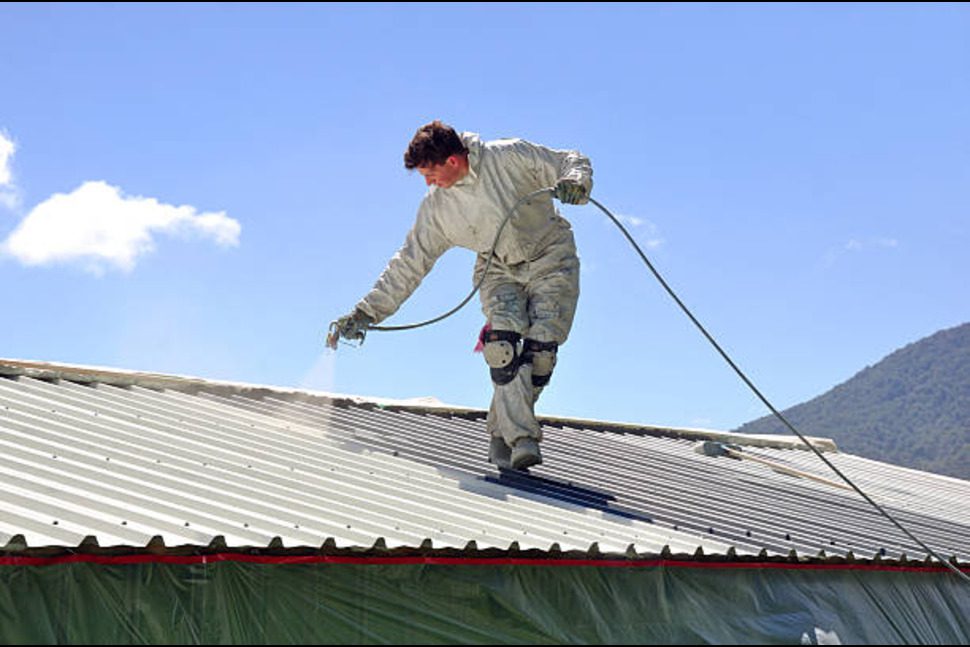
West Coast Residential Earthquake Insurance
June 2, 2023
Homeowners Insurance Overview
June 13, 2023Manufactured homes or Mobile homes need their roofs maintained just like the roofs of site-built homes. Manufactured homes have different types of available roofs but there are also coatings available to enhance the protection for your home. If you are planning to purchase a mobile home, a good inspector will always pay attention to the roof as it is considered a major part of the home and a leaking roof could become a substantial expense.
The Importance of Focusing on Mobile Home Roof Coating
Mobile home roofs require care and maintenance. Your mobile home roof is your secure shelter; you wouldn’t want to neglect the roof and overlook any deterioration as a result of not properly sealing the roof and assuring that any moisture is channeled as necessary. With the heat in the summers and the cold of the winters, it is quite normal to get expansion and contraction of materials exposing cracks in the roof which may only be visible to water, this is where the roof coatings come into use.
In some cases, if the homeowner is spending a lot of money on roof repairs, it may be best to replace the roof and get the most recent and state of the art materials to protect your home for the long term.
What is the Best Roof Coating for Mobile Homes?
So, what will be the best roof coating for your mobile home roof? Some roofing contractors may claim to do all kinds of jobs; flat roofing, shingle roofs, and metal roofs. It is important to find a roofing contractor who truly has experience with manufactured homes. Roofing on a mobile home could last for as much as 50 years if using the right materials, proper installation & ongoing roof maintenance.
While your mobile home roof might have a few characteristics in common with traditional roofs, there are some essential differences. Mobile homes tend to have roof coatings instead of shingles or asphalt, so this is where you need to start. Although some mobile home roof coatings may be more affordable, others may be more energy-efficient, thus making the latter the best option and offer the best long term savings to both protect the roof above your head as well as offer energy savings for your home.
What Exactly are Mobile Home Roof Coatings?
Roof coatings are typically acrylic, reflective and are commonly rolled on to a flat or shallow pitch roofing material. Coatings are designed to create a water proof seal and protect your roof for the long term. A manufactured home roof will have a lower pitch than that of traditional houses. Some of them have flat roofs, which make them more vulnerable to extreme weather, especially heavy rains. Although it isn’t common to find ‘Flat’ roofs any more, many manufactured homes have a much shallower pitch than you would find on a typical site-built home. Flat roofs have always been associated with more water damage problems over time.
Precautions to Take with Your Mobile Home Roof
Outright replacing or repairing the entire surface of your mobile home roof could be quite difficult and expensive. The good news is that it is not that hard to replace a part of it or apply more roof coating where required.
Nearby tree branches and the wind could also cause some issues with your roof surface. Make sure to check the wind zone ratings for mobile homes before you decide to have a mobile home in any specific area. Here are a few more precautions a mobile homeowner can take to minimize the frequency and need of roof coat repairs:
- The first step is to clean the manufactured home roof frequently; this will preserve the old coating as long as possible
- Take extra care to clean the manufactured home roof after heavy winds or rainfall
- Remove any water as soon as you can; consider having extra paneling on the roof seams or at least a high-quality seal coating
- Installing a couple of gutters may also help the water to run off instead of pooling on a manufactured home roof and ruining the roof coatings
Different Types of Roof Coatings
If you want to choose the best roof coating for your mobile home, take a look at each option first. Consider the pros and cons before making any final decision, as this new coating should last a long time and require a decent investment. Here are some of the most common roof coating options now:
- Aluminum Coating
Aluminum roof coating is among the cheaper options for any mobile home. This coating includes aluminum fibers, asphalt, and petroleum. It may result in a metal roof, but it is excellent for warmer climates. The surface is reflective, which keeps the mobile home cool on the inside.
This kind of roof coating is also long-lasting and convenient. It can secure your mobile home’s roof in about 24 hours.
- Silicone Coating
You may also use a roof coating that contains silicone. If you want to fill cracks in your roof cement, silicone is an effective adhesive and coating solution for this purpose. It will also even out any dents and other irregularities.
Silicone lasts a lot longer than many other materials for roof coating, so be sure to consider it seriously. Options like the Kool Seal rubberized silicone roof coating will also prevent water from pooling on your manufactured home.
- Acrylic Coating
An acrylic roof coating is great for hot climates, providing extra protection from the sun. It is also good for helping a mobile home’s roof contract or expand according to the weather.
If you are leaning towards an acrylic roof coating for your manufactured homes, do look at elastomeric coating. These are proactive coatings that you can apply either inside or outside a building. While some elastomeric coatings are water-based, make sure to use an acrylic-based one for your mobile home. This roof coating is in the form of a latex paint. Once the product is dry, it will be transparent, yet flexible and stretchable.
An elastomeric coating is great for protecting your manufactured home from moisture. However, make sure not to use it on any logs or wooden surfaces. If you do, even a little missed spot could let in some moisture and not let it dry. This then leads to mold, decay, and other forms of damage.
- Self-Adhesive Coating
The special thing about this coating is that it comes in rolls of films with all the protective material already on them. You do not need any brush to apply it, but it is still quite durable and easy to install. These features make this roof coating especially popular. The films might be of aluminum foil with an asphalt layer or some other combination, but no matter which type you choose, go for something that offers water protection as well as insulation.
How to Apply a Mobile Home Roof Coating
Different materials for your mobile home roof may have different features. You will have to choose by looking at its application method, maintenance requirements, and the area your mobile home is in.
You should know the ins and outs of applying roof coating materials. This might save you a few bucks for the installation. Even if you get some help with the project, it helps to know just what to expect. Let us now have a look at how to apply different kinds of roof coating to your mobile home:
- Applying Aluminum Coating
For most manufacturers, this type of coating will fully form around 24 hours after application. This will get you a cost-effective, heat-diverting, and durable roof coating.
When you purchase this coating, make sure to mention that it is for a mobile home. The coating for regular house roofs is different.
- Applying Silicone Coating
Silicone provides insulation, which is best for colder climates. Its smooth surface will also reflect sunlight, so it is suitable for the warmer weather as well. In a nutshell, it won’t crack in the cold nor melt in the heat.
Silicone coating requires no specific surface preparation like metal primers. It will fill up the cracks and dents, therefore you can just start by following the instructions from the manufacturer.
- Applying Acrylic Coating
This kind of coating might require a spray application. You will first have to prepare the surface of the mobile home roof. Fix up any major deterioration, such as large cracks, and consider applying a metal primer with a paint roller.
This kind of coating will usually apply in a similar way to repair paint. You will have to give the roof a few layers so that the coating remains durable and effective.
- Applying Self–Adhesive Coating
Applying this kind of coating is not difficult, but you do have to take certain steps. Once you complete these, there is no need to use a brush. All you have to do is stick the coating over the mobile home roof.
The steps for applying self-adhesive coating are important. You should also follow them before applying any other type of coating as well. This will enable you to get the best result possible. Let’s have a look at these now.
Steps for DIY Mobile Home Roof Coating Installation
Here are the precautions and steps to take before applying any kind of roof coating to your mobile home:
- Check the weather forecasts and don’t start the application if it looks like rain
- Give yourself enough time to allow for drying time as well
- Inspect the roof and clear away any blockages or dirt
- Remove the old coating using sandpaper, if required
- Conduct any minor repair, such as tightening screws, etc.
- Dilute bleach and use it to clear up mildew or other unwanted growths
- Apply metal primer over the whole surface using a brush and leave it to dry
- Prepare the coating mixture and begin painting the roof seams before moving on to the main area
Mobile Home Roof Summary
A damaged roof or leaking mobile home roof can create an unlivable situation. Furthermore, if you don’t have a Replacement Cost Mobile Home Insurance Policy covering your home and you’re met with a catastrophic event, you may be in for a huge surprise. In short, let’s take care of our homes, maintain them as necessary, insure them as necessary and enjoy home sweet home! Just in case, make sure to inspect and/or repair the mobile home’s roof coating after every two years. The best roof coating for any mobile home will depend on the geographic location and what issues it will face. While silicone coatings may be best for both hot and cold weather, aluminum ones may be better for someone who lives in a warm area and is looking to cut costs.

